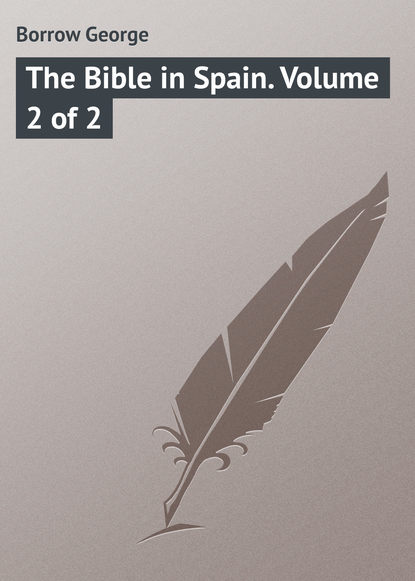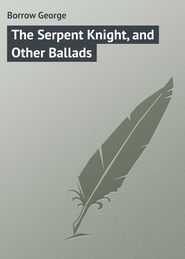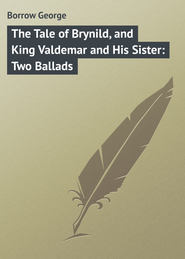По всем вопросам обращайтесь на: info@litportal.ru
(©) 2003-2024.
✖
The Bible in Spain. Volume 2 of 2
Настройки чтения
Размер шрифта
Высота строк
Поля
“Then to the next village,” continued Antonio.
“I am a vecino of the next village, which is on the way to Rivadeo,” said another voice, “and I will lead you thither, if you will give me fair words, and, what is better, fair money.”
A man now came forth, holding in his hand a large stick. He strode sturdily before us, and in less than half an hour led us out of the wood. In another half-hour he brought us to a group of cabins situated near the sea; he pointed to one of these, and having received a peseta, bade us farewell.
The people of the cottage willingly consented to receive us for the night; it was much more cleanly and commodious than the wretched huts of the Gallegan peasantry in general. The ground floor consisted of a keeping room and stable, whilst above was a long loft, in which were some neat and comfortable flock beds. I observed several masts and sails of boats. The family consisted of two brothers, with their wives and families. One was a fisherman; but the other, who appeared to be the principal person, informed me that he had resided for many years in service at Madrid, and, having amassed a small sum, he had at length returned to his native village, where he had purchased some land, which he farmed. All the family used the Castilian language in their common discourse, and on inquiry I learned that the Gallegan was not much spoken in that neighbourhood. I have forgotten the name of this village, which is situated on the estuary of the Foz, which rolls down from Mondonedo. In the morning we crossed this estuary in a large boat, with our horses, and about noon arrived at Rivadeo.
“Now, your worship,” said the guide, who had accompanied us from Ferrol, “I have brought you as far as I bargained, and a hard journey it has been: I therefore hope you will suffer Perico and myself to remain here to-night at your expense, and to-morrow we will go back; at present we are both sorely tired.”
“I never mounted a better pony than Perico,” said I, “and never met with a worse guide than yourself. You appear to be perfectly ignorant of the country, and have done nothing but bring us into difficulties. You may, however, stay here for the night, as you say you are tired, and to-morrow you may return to Ferrol, where I counsel you to adopt some other trade.” This was said at the door of the posada of Rivadeo.
“Shall I lead the horses to a stable?” said the fellow.
“As you please,” said I.
Antonio looked after him for a moment, as he was leading the animals away, and then, shaking his head, followed slowly after. In about a quarter of an hour he returned, laden with the furniture of our own horse, and with a smile upon his countenance. “Mon maître,” said he, “I have throughout the journey had a bad opinion of this fellow, and now I have detected him: his motive in requesting permission to stay was a desire to purloin something from us. He was very officious in the stable about our horse, and I now miss the new leathern girth which secured the saddle, and which I observed him looking at frequently on the road. He has by this time doubtless hid it somewhere; we are quite secure of him, however, for he has not yet received the hire for the pony, nor the gratuity for himself.”
The guide returned just as he had concluded speaking. Dishonesty is always suspicious. The fellow cast a glance upon us, and probably beholding in our countenances something which he did not like, he suddenly said, “Give me the horse-hire and my own propina, for Perico and I wish to be off instantly.”
“How is this?” said I; “I thought you and Perico were both fatigued, and wished to rest here for the night: you have soon recovered from your weariness.”
“I have thought over the matter,” said the fellow, “and my master will be angry if I loiter here: pay up, therefore, and let us go.”
“Certainly,” said I, “if you wish it. Is the horse furniture all right?”
“Quite so,” said he; “I delivered it all to your servant.”
“It is all here,” said Antonio, “with the exception of the leathern girth.”
“I have not got it,” said the guide.
“Of course not,” said I. “Let us proceed to the stable; we shall perhaps find it there.”
To the stable we went, which we searched through: no girth, however, was forthcoming. “He has got it buckled round his middle beneath his pantaloons, mon maître,” said Antonio, whose eyes were moving about like those of a lynx; “I saw the protuberance as he stooped down. However, let us take no notice: he is here surrounded by his countrymen, who, if we were to seize him, might perhaps take his part. As I said before, he is in our power, as we have not paid him.”
The fellow now began to talk in Gallegan to the bystanders (several persons having collected), wishing the Denho to take him if he knew anything of the missing property. Nobody, however, seemed inclined to take his part; and those who listened only shrugged their shoulders. We returned to the portal of the posada, the fellow following us, clamouring for the horse-hire and propina. We made him no answer, and at length he went away, threatening to apply to the justicia; in about ten minutes, however, he came running back with the girth in his hand. “I have just found it,” said he, “in the street: your servant dropped it.”
I took the leather and proceeded very deliberately to count out the sum to which the horse-hire amounted, and having delivered it to him in the presence of witnesses, I said, “During the whole journey you have been of no service to us whatever; nevertheless, you have fared like ourselves, and have had all you could desire to eat and drink. I intended, on your leaving us, to present you, moreover, with a propina of two dollars; but since, notwithstanding our kind treatment, you endeavoured to pillage us, I will not give you a cuarto: go, therefore, about your business.”
All the audience expressed their satisfaction at this sentence, and told him that he had been rightly-served, and that he was a disgrace to Galicia. Two or three women crossed themselves, and asked him if he was not afraid that the Denho, whom he had invoked, would take him away. At last, a respectable-looking man said to him, “Are you not ashamed to have attempted to rob two innocent strangers?”
“Strangers!” roared the fellow, who was by this time foaming with rage, “innocent strangers, carracho! they know more of Spain and Galicia, too, than the whole of us. Oh, Denho, that servant is no man, but a wizard, a nuveiro. – Where is Perico?”
He mounted Perico, and proceeded forthwith to another posada. The tale, however, of his dishonesty had gone before him, and no person would house him; whereupon he returned on his steps, and seeing me looking out of the window of the house, he gave a savage shout, and shaking his fist at me, galloped out of the town, the people pursuing him with hootings and revilings.
CHAPTER XXXII
Martin of Rivadeo – The Factious Mare – Asturians – Luarca – The Seven Bellotas – Hermits – The Asturian’s Tale – Strange Guests – The Big Servant – Batuschca.
“What may your business be?” said I to a short, thick, merry-faced fellow in a velveteen jerkin and canvas pantaloons, who made his way into my apartment in the dusk of the evening.
“I am Martin of Rivadeo, your worship,” replied the man, “an alquilador by profession. I am told that you want a horse for your journey into the Asturias to-morrow, and of course a guide: now, if that be the case, I counsel you to hire myself and mare.”
“I am become tired of guides,” I replied; “so much so that I was thinking of purchasing a pony, and proceeding without any guide at all. The last which we had was an infamous character.”
“So I have been told, your worship, and it was well for the bribon that I was not in Rivadeo when the affair to which you allude occurred. But he was gone with the pony Perico before I came back, or I would have bled the fellow to a certainty with my knife. He is a disgrace to the profession, which is one of the most honourable and ancient in the world. Perico himself must have been ashamed of him, for Perico, though a pony, is a gentleman, one of many capacities, and well known upon the roads. He is only inferior to my mare.”
“Are you well acquainted with the road to Oviedo?” I demanded.
“I am not, your worship; that is, no farther than Luarca, [16 - A town on the sea-coast about half-way between Rivadeo and Aviles.] which is the first day’s journey. I do not wish to deceive you, therefore let me go with you no farther than that place; though perhaps I might serve for the whole journey, for though I am unacquainted with the country, I have a tongue in my head, and nimble feet to run and ask questions. I will, however, answer for myself no farther than Luarca, where you can please yourselves. Your being strangers is what makes me wish to accompany you, for I like the conversation of strangers, from whom I am sure to gain information both entertaining and profitable. I wish, moreover, to convince you that we guides of Galicia are not all thieves, which I am sure you will not suppose if you only permit me to accompany you as far as Luarca.”
I was so much struck with the fellow’s good humour and frankness, and more especially by the originality of character displayed in almost every sentence which he uttered, that I readily engaged him to guide us to Luarca; whereupon he left me, promising to be ready with his mare at eight next morning.
Rivadeo is one of the principal seaports of Galicia, and is admirably situated for commerce, on a deep firth, into which the river Mirando [17 - Query. See note, p. 45.] debouches. It contains many magnificent buildings, and an extensive square or plaza, which is planted with trees. I observed several vessels in the harbour; and the population, which is rather numerous, exhibited none of those marks of misery and dejection which I had lately observed among the Ferrolese.
On the morrow Martin of Rivadeo made his appearance at the appointed hour with his mare. It was a lean haggard animal, not much larger than a pony; it had good points, however, and was very clean in its hinder legs, and Martin insisted that it was the best animal of its kind in all Spain. “It is a factious mare,” said he, “and I believe an Alavese. When the Carlists came here it fell lame, and they left it behind, and I purchased it for a dollar. It is not lame now, however, as you shall soon see.”
We had now reached the firth which divides Galicia from the Asturias. A kind of barge was lying about two yards from the side of the quay, waiting to take us over. Towards this Martin led his mare, and giving an encouraging shout, the creature without any hesitation sprang over the intervening space into the barge. “I told you she was a facciosa,” said Martin; “none but a factious animal would have taken such a leap.”
We all embarked in the barge and crossed over the firth, which is in this place nearly a mile broad, to Castro Pol, [18 - On the right bank of the Eo, over against Rivadeo.] the first town in the Asturias. I now mounted the factious mare, whilst Antonio followed on my own horse. Martin led the way, exchanging jests with every person whom he met on the road, and occasionally enlivening the way with an extemporaneous song.
We were now in the Asturias, and about noon we reached Navias, a small fishing-town, situate on a ria or firth: in the neighbourhood are ragged mountains called the Sierra de Buron, which stand in the shape of a semicircle. We saw a small vessel in the harbour, which we subsequently learned was from the Basque provinces, come for a cargo of cider or sagadua, the beverage so dearly loved by the Basques. As we passed along the narrow street, Antonio was hailed with an “Ola!” from a species of shop in which three men, apparently shoemakers, were seated. He stopped for some time to converse with them, and when he joined us at the posada where we halted, I asked him who they were: “Mon maître,” said he, “ce sont des messieurs de ma connoissance. I have been fellow-servant at different times with all three; and I tell you beforehand, that we shall scarcely pass through a village in this country where I shall not find an acquaintance. All the Asturians, at some period of their lives, make a journey to Madrid, where, if they can obtain a situation, they remain until they have scraped up sufficient to turn to advantage in their own country; and as I have served in all the great houses in Madrid, I am acquainted with the greatest part of them. I have nothing to say against the Asturians, save that they are close and penurious whilst at service; but they are not thieves, neither at home nor abroad, and though we must have our wits about us in their country, I have heard we may travel from one end of it to the other without the slightest fear of being either robbed or ill-treated, which is not the case in Galicia, where we were always in danger of having our throats cut.”
Leaving Navias, we proceeded through a wild desolate country, till we reached the pass of Baralla, which lies up the side of a huge wall of rocks, which at a distance appear of a light green colour, though perfectly bare of herbage or plants of any description.
“This pass,” said Martin of Rivadeo, “bears a very evil reputation, and I should not like to travel it after sunset. It is not infested by robbers, but by things much worse, the duendes of two friars of Saint Francis. It is said that in the old time, long before the convents were suppressed, two friars of the order of Saint Francis left their convent to beg. It chanced that they were very successful, but as they were returning at nightfall by this pass, they had a quarrel about what they had collected, each insisting that he had done his duty better than the other; at last, from high words they fell to abuse, and from abuse to blows. What do you think these demons of friars did? They took off their cloaks, and at the end of each they made a knot, in which they placed a large stone, and with these they thrashed and belaboured each other till both fell dead. Master, I know not which are the worst plagues, friars, curates, or sparrows:
‘May the Lord God preserve us from evil birds three:
From all friars and curates and sparrows that be;
For the sparrows eat up all the corn that we sow,
The friars drink down all the wine that we grow,
Whilst the curates have all the fair dames at their nod:
From these three evil curses preserve us, Lord God.’”
In about two hours from this time we reached Luarca, the situation of which is most singular. It stands in a deep hollow, whose sides are so precipitous that it is impossible to descry the town until you stand just above it. At the northern extremity of this hollow is a small harbour, the sea entering by a narrow cleft. We found a large and comfortable posada, and by the advice of Martin, made inquiry for a fresh guide and horse; we were informed, however, that all the horses of the place were absent, and that if we waited for their return, we must tarry for two days. “I had a presentiment,” said Martin, “when we entered Luarca, that we were not doomed to part at present. You must now hire my mare and me as far as Gijon, [19 - The port of Oviedo.] from whence there is a conveyance to Oviedo. To tell you the truth, I am by no means sorry that the guides are absent, for I am pleased with your company, as I make no doubt you are with mine. I will now go and write a letter to my wife at Rivadeo, informing her that she must not expect to see me back for several days.” He then went out of the room, singing the following stanza: —
“A handless man a letter did write,
A dumb dictated it word for word:
The person who read it had lost his sight,
And deaf was he who listened and heard.” [20 - See the Glossary, s. v. Copla.]
Early the next morning we emerged from the hollow of Luarca; about an hour’s riding brought us to Caneiro, a deep and romantic valley of rocks, shaded by tall chestnut trees. Through the midst of this valley rushes a rapid stream, which we crossed in a boat. “There is not such a stream for trout in all the Asturias,” said the ferryman. “Look down into the waters and observe the large stones over which it flows; now in the proper season, and in fine weather, you cannot see those stones for the multitudes of fish which cover them.”
Leaving the valley behind us, we entered into a wild and dreary country, stony and mountainous. The day was dull and gloomy, and all around looked sad and melancholy. “Are we in the way for Gijon and Oviedo?” demanded Martin of an ancient female, who stood at the door of a cottage.
“For Gijon and Oviedo!” replied the crone; “many is the weary step you will have to make before you reach Gijon and Oviedo. You must first of all crack the bellotas: you are just below them.”
“What does she mean by cracking the bellotas?” demanded I of Martin of Rivadeo.











